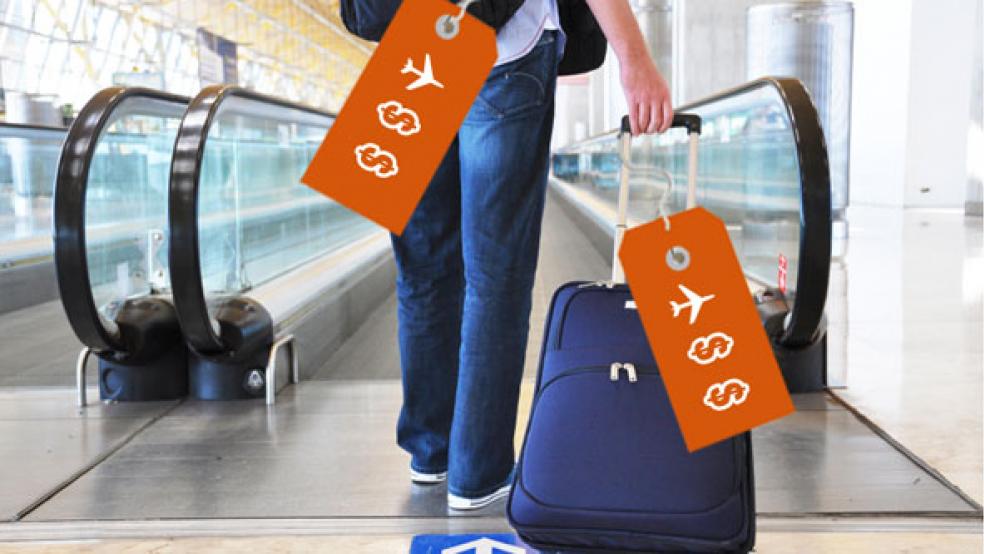If you’re an air traveler, you need advanced web-sleuthing skills to figure out how much it will actually cost you to fly these days. New airline fees have sprouted up everywhere, and you can track them down if you find the right page on your carrier’s website.
Want to watch an inflight movie? That’ll be $6 on Delta. How about a pillow and a blanket? You’ll have to buy the set for 7 bucks on JetBlue. Want to sit next to your child? On many airlines, that will be $25 extra to snag a coveted aisle or window seat next to them. Even the use of the overhead bin to stow the bag you didn’t check in an effort to save money will cost you $20 to $45 on Spirit Air.
RELATED: 7 Secrets to Scoring Cheap Airline Tickets
Airline fees for formerly-standard services have been around for some time, of course, when Delta started charging for onboard food on some flights in 2003. The real fee bonanza, though, dates to 2008, when most major airlines began imposing baggage charges to offset a rise in jet fuel prices.
But in 2009, jet fuel costs fell dramatically while fees stayed. And not only stayed – they’ve soared. The industry took in $1.1 billion in baggage fees in 2008; by last year that figure more than tripled, to $3.4 billion. During that period, average oil prices actually fell from $91 to $87 a barrel. And that’s just one type of fee: No one breaks down how much the industry collects in charges for movies, pillows, or reservations of preferred aisle or window seats, for example. Two industry groups recently estimated that U.S. airlines earned $12.5 billion in total fees for 2011.
With travelers complaining, members of Congress are stepping in. Sen. Charles Schumer (D-N.Y.) has expressed concern about families being separated on flights unless they pay a fee of $25 or more to get a window or aisle seat. The practice “raises safety and liability concerns for the airline, as children potentially have to sit with strangers out of the sight line of their parents,” he wrote in a May 29 letter to Transportation Secretary Ray LaHood. And Sen. Mary Landrieu (D-La.) introduced legislation late last year that would mandate airlines to allow passengers to bring one bag and one carry-on for free.
But Steve Lott, a spokesman for Airlines for America, an industry trade group, says that carriers do to try to seat parties together, and in a competitive market, customers win when airlines offer different products and pricing structures. “As with all other products and industries, it’s the market that should determine how air travel is priced, not the government,” he says.
RELATED: 22 Hidden Travel Fees That Could Bust Your Budget
Lott argues that new fees are essential if airlines are to stay afloat, since fares are not covering the combined costs of fuel, labor, and maintenance. Government data show that ticket prices have actually dropped 13 percent since 1995 after inflation is taken into account.
Given that reality, the fees that consumers most object to – like those for baggage – aren’t likely to go away anytime soon. For now, the best that travelers can do is plan ahead to figure out what extras your carrier will charge once you show up at the gate.
Here are the five airlines that earned the most in baggage and ticket change fees in 2011*, and how much they charge for food, pets, entertainment and more:
1. Delta collected $1.6 billion in baggage and ticket change fees in 2011, while carrying 113 million passengers (an average of $14 per passenger), according to government statistics. Here’s how Delta’s charges break down for the individual traveler on domestic flights:
• Baggage: $25 for the first bag, $35 for the second, $125 for the third
• Food: $2-$5.50 for snacks, $3.50-$8.50 for meals
• Pets: $125 in the cabin, $200 checked through
• Unaccompanied child service (one way): $100 per family (two or more children from the same family pay one fee)
• Seating: Bulkhead, aisle, window, and emergency exit row seats can be reserved in advance for a fee that varies by type and flight
• Entertainment: $6 per inflight movie, $2 per TV program
• Other fees: $50 to get a paper ticket, $25 to book by phone
2. United pulled in a total of $1.2 billion in baggage and ticket change fees last year while carrying 96 million passengers ($12.50 per passenger). United merged with Continental on November 30, 2011, so these figures represent the companies’ combined total. Here’s how United’s individual fees stack up:
• Baggage: $25 for the first bag, $35 for the second, $100 for the third
• Food: $2.49-$8.49 for snacks, $2.99-$9.49 for meals
• Pets: $125 in the cabin, checking pets through not available
• Unaccompanied child service (one way): $99
• Seating: Extra legroom available for a variable fee
• Entertainment: $5.99-$7.99 for DIRECTV (Inflight movie cost unavailable)
• Other fees: $50 to get a paper ticket, $25 to book by phone, $30 to buy in person from a ticket office
3. American racked up $1.1 billion in baggage and ticket change fees and flew 86 million passengers ($12.79 per passenger). Here are the fees you’ll pay when flying American:
• Baggage: $25 for the first bag, $35 for the second, $150 for the third
• Food: $2.99-$5.29 for snacks, $3.29-$10 for meals
• Pets: $125 in the cabin, $175 checked through
• Unaccompanied child service (one way): $100 per family
• Seating: Preferred seats near front of main cabin are available starting at $4 per flight
• Entertainment: $3.99 per movie streamed on computer, $.99 per streamed TV show
• Other fees: $50 to get a paper ticket
4. U.S. Airways collected $782 million in baggage and reservation change fees last year from 53 million passengers ($14.75 a passenger). The airline charges individual travelers as follows:
• Baggage: $25 for the first bag, $35 for the second, $125 for the third
• Food: $3-$6 for snacks, $5-$8 for meals
• Pets: $125 in the cabin, checking pets through not available
• Unaccompanied child service (one way): $100 (available on non-stop flights only)
• Seating: Window and aisle seats toward front of coach class can be purchased; fee depends on flight
• Entertainment: Movies and TV offered only on flights to Hawaii and international locations
• Other fees: $50 to get a paper ticket
5. Southwest and AirTran, which merged this spring but won’t be fully integrated until 2014, earned $247 million in baggage and change fees in 2011 while flying a combined 135 million passengers ($1.82 per passenger). The companies’ individual fees are the lowest of the five:
• Baggage: AirTran: $20 for the first bag, $25 for the second, $50 for the third. Southwest: Free for the first bag, free for the second, $50 for the third
• Food: AirTran and Southwest: Free for snacks, meals not offered
• Pets: AirTran and Southwest: $75 in the cabin; checking pets through not available on either carrier
• Unaccompanied child service: AirTran: $39 on nonstop flights per family; $59 on connecting flights per family. Southwest: $50 per child, nonstop flights only
• Entertainment: Movies and TV not offered on either airline
• Seating: AirTran: Seats toward front of cabin and in exit rows available for fees that vary. Southwest:$10 for early check-in to get better seat selection
*These data cover only baggage fees and charges for ticket reservation changes. The Bureau of Transportation Statistics notes that “baggage fees and reservation change fees are the only ancillary fees paid by passengers that are reported to BTS as separate items. Other fees, such as revenue from seating assignments and on-board sales of food, beverages, pillows, blankets, and entertainment … cannot be identified separately.”





